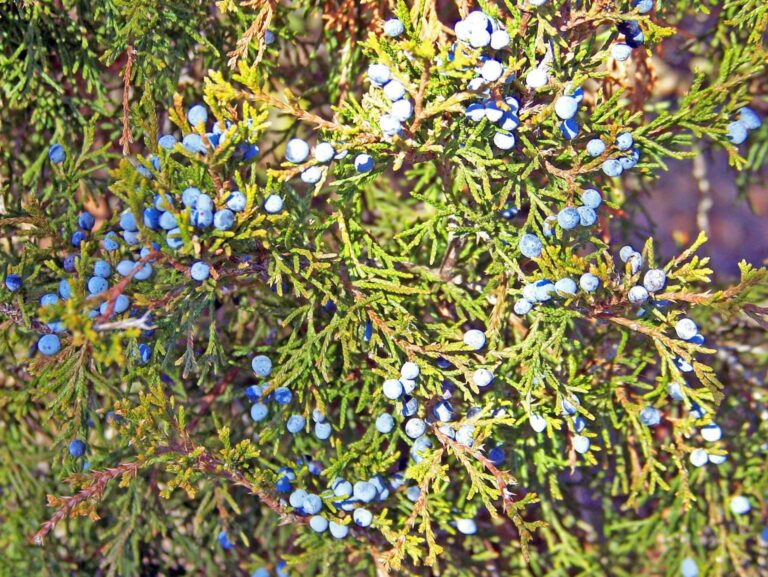When you’re living off the land, there’s a wide variety of edible plants from which you can choose to eat. On the other hand, there’s also a wide variety of inedible plants which will make you very sick (or worse) if ingested.
With that in mind, it’s important to know what you’re eating.

When it comes to juniper trees or shrubs and their fleshy cones that we call berries, you can find them in Africa, North America, the Middle East and Asia and they look rather appetizing but are they safe to eat or are they poisonous? Are juniper berries poisonous?
Yes, most juniper berries are poisonous, though some contain only small amounts of thujone, a toxic compound, which may make some varieties safe to eat in small quantities.
Some berries are safe for human consumption in small quantities. High quantities can cause vomiting, diarrhea, convulsions, stomach pains; they can also have a serious negative impact on your kidneys, and, in some cases, they can be fatal.
Types of Juniper Plants
Most juniper plants are poisonous to some extent, but some are more poisonous than others.
The most common juniper plants are Juniperus Communis and Juniperus Sabina. Juniperus Communis and is considered the safest one to eat. As such, it’s commonly used as a flavorant in drinks and in cooking.
Other plants which produce safe berries are:
- Juniperus deppeana
- Juniperus phoenicea
- Juniperus californica
- Juniperus drupacea
It’s important to note that you should not eat any of these in high quantities.
You Must Identify Toxic Juniper Shrubs and Trees Before Gathering Berries
It is critical to take great care when handling any juniper plant, but especially if you plan on consuming the berries or using them in a recipe.
Make sure you identify the species of plant with absolute certainty – some are safe while others have poisonous berries that will cause severe gut pain and diarrhea at best, and potentially leave you crippled or dead!
Do not interact with, eat from, or handle the leaves, berries or branches of the following species; they both contain highly concentrated toxins throughout:
- Juniperus sabina
- Juniperus oxycedrus
Juniperus Sabina or the Savin Juniper contains savin oil, which is highly toxic and, in a best- case scenario, will lead to vomiting, diarrhea, and stomach pain. In a worst-case scenario, ingestion of savin oil can be fatal.
There are other toxic variants of juniper berries which contain volatile oils which may cause problems of varying severity.
Once more, understand that all the parts of a juniper shrub or tree contain the hazardous compound thujone, including the berries, but also the roots, leaves, bark, etc.
If you want to gather or eat juniper berries, make sure that you are 100% certain of the species you are dealing with, and also 100% certain you AREN’T handling one of the two mentioned above.
If in doubt, play it safe and steer clear: either could kill you. Also do not assume that they are not present in your region or area because a “safe” species of juniper is growing nearby and predominant. If one species can grow there, so can others!
Safe Uses for Juniper Berries
For centuries, juniper berries have played a role in both medicine and cooking. Today, they are best known for the characteristic and divisive flavor of gin.
Gin first hit the scenes way, way back in the mid-1600s when a Dutch doctor first distilled it as a component of liquid medicine.
It turned out it wasn’t a panacea, but gin was popular with drinkers and has been a popular, strong liquor ever since, as people quickly found out that they could get quite drunk off of it.
Juniper berries have long been used for their medicinal properties, and they have been employed in various cultures around the world for centuries.
Juniper berry tea or tonic can help treat indigestion, sore throat, constipation, and even scurvy. Ground juniper berries are once again used in makeup, ointments and even for toothpaste.
Native Americans used juniper berries in a variety of ways, from treating snakebites to brewing their own traditional medicines.
It has been claimed more than once that juniper berries could be used to alleviate certain conditions. These conditions include but are not limited to:
- Dyspepsia
- Arthritis
- Insomnia
- Bronchitis
- High Cholesterol
- Rashes and eczema
Aside from medicine and as liquor, safe juniper berries have a relatively small but somewhat distinguished role in cuisine around the globe. Though juniper berries don’t have a great taste when eaten whole, they are often dried and ground to be used as a spice in various dishes. Juniper berries are especially popular in European cuisine, where they are often added to sauerkraut, various vinegars, and other ethnic foods. Juniper is also loved for its ability to cut through the strong and sometimes unpleasant flavors of wild game, be it poultry or otherwise. It also turns up periodically as a flavoring for beer where it lends a bracing pine or citrus aroma.
In short, juniper berries can offer plenty of benefits, but one must be extremely careful and cautious when gathering or eating them. Make sure you are certain of the species you are dealing with and take great care not to consume any other plant part.
Side Effects and Toxicity
Medicinal uses for juniper plants are limited by the presence of toxic oils like savin oil (Juniperus sabina) and thujone oil – which is present in all juniper plants.
Savin oil contains podophyllotoxin which destroys the body’s cells – resulting in fatalities. Thujone is the oil which, in high quantities, causes stomach pain, diarrhea, and kidney problems.
When it comes to side effects and symptoms, there are a few that have been documented including:
- Skin rash
- Breathing difficulties
- Kidney damage
- Increased sugar levels
Additionally, some people are allergic to juniper berries and will have bad reactions to consumption which will require medical attention. High levels of juniper berries can cause diarrhea, vomiting, and convulsions.
Aside from medicine and as liquor, safe juniper berries have a relatively small but somewhat distinguished role in cuisine around the globe.
Though juniper berries don’t have a great taste when eaten whole, they are often dried and ground to be used as a spice in various dishes.
Juniper berries are especially popular in European cuisine, where they are often added to sauerkraut, various vinegars, and other ethnic foods. Juniper is also loved for its ability to cut through the strong and sometimes unpleasant flavors of wild game, be it poultry or otherwise.
It also turns up periodically as a flavoring for beer where it lends a bracing pine or citrus aroma.
In short, juniper berries can offer plenty of benefits, but one must be extremely careful and cautious when gathering or eating them. Make sure you are certain of the species you are dealing with and take great care not to consume any other plant part.
Making Infusions
Now, if they’re poisonous then why is it that foods / drinks containing juniper berries / berry extract are sold/eaten? Well, here’s the thing; usually, there are only traces of the berry/berry extract – enough to give flavor/color.
Juniper berries have a powerful effect on your kidneys and can cause serious problems when eaten in high quantities.
To avoid this, most drinks are made via infusion; you add a tablespoon of juniper berries to a bottle of spirits (i.e. vodka) and leave it for about a week in a cool, dark place. You can then add any other flavors (cinnamon, orange zest, etc.) that you like.
Once the infusing is done, you filter the berries and other flavoring agents. This allows you to have the flavor of juniper berries with little to no exposure to the toxic oils – the oils are, after all, located inside the fruit.
In Conclusion: Not Recommended for Consumption
To recap:
- Yes, most juniper berries are poisonous, but some are more poisonous than others.
- Berries of certain juniper plants are safe to eat in small quantities.
- There’s limited research into medicinal use/health benefits, but claims have been made about using juniper berries to alleviate certain conditions.
- Toxic levels of juniper berries will cause either physical discomfort or they can be fatal.
I’ve said it before, and I’ll say it again; don’t eat something if you don’t know what it is!
There are certain juniper berries which are safe to eat, but it’s generally not recommended for consumption. They don’t have a nice flavor and the risk of poisoning and/or allergic reactions is just not worth it.
With all that said, I hope you enjoyed the article and found it informative. Thank you for reading and I’ll see you again in the next one! Take care.

Greg spent most of his childhood in camping grounds and on hiking trails. While he lives in the suburbs nowadays, Greg was raised on a small farm with chickens. He’s a decent shot with a bow, and a huge knife enthusiast. Find out more about Greg.

Juniper berries are the basis for Gin. They can be eaten – see this link.
https://www.gardeningknowhow.com/ornamental/shrubs/juniper/what-to-do-with-juniper-berries.htm
They are definitely not the basis. In addition, in gin they are added through infusion, the berries aren’t squeezed to allow the liquid to blend.
Thujone is a ketone that is very toxic, which can be found in various juniper berries in various degrees.
So it’s a bad idea to eat them unless you know very well what you’re doing. Are you able to identify the ones that are safest and be sure you yourself won’t be affected?
Just because you can, doesn’t mean you should, and just because it’s a plant or natural, that doesn’t make it completely safe.
Here in eastern Oregon we have juniper trees EVERYWHERE. I’ve caught my dogs eating them. What’s your opinion?